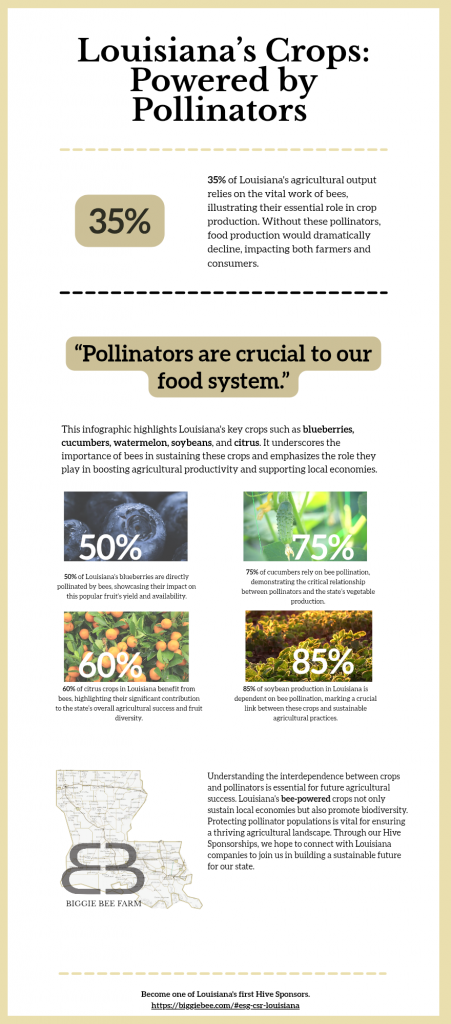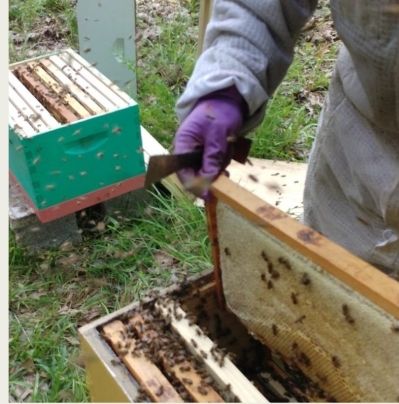Local Louisiana
At Biggie Bee Farm, we invest in bees because bees have always invested in us and our world.
A World Without Bees: What Would We Lose?
Imagine waking up in a world where bees no longer exist. No low hum in summer air, no zigzagging flights between flowers, no honey. At first, it might sound like a small loss. After all, bees are tiny. But the chain reaction their absence would set off is massive—and terrifying.
The Collapse of Pollination
Bees are the backbone of natural pollination. Roughly one-third of the food we eat relies on pollinators, and bees are the heavy lifters of the group. Without them, many fruits, vegetables, nuts, and seeds would vanish or become astronomically expensive. Apples, almonds, berries, cucumbers, coffee—all gone or reduced to luxury items. The global diet would tilt heavily toward grains and staple crops like wheat, rice, and corn (which rely less on bees), stripping our meals of variety and nutrients.
Ripple Effects in Ecosystems
It’s not just about us. Wild plants depend on bees, too. Without pollination, ecosystems unravel. Fewer flowering plants means fewer seeds, fewer fruits, and fewer habitats for other species. Birds, small mammals, and insects that rely on these plants for food would decline, and the cascade of loss would spiral upward through food webs. The absence of bees would mean a quieter, emptier natural world.
Economic Shockwaves
Agriculture is tightly interwoven with bee activity. Farmers rent hives to pollinate their crops. Without bees, industries would scramble to replace their labor with human hands or machines. The costs would skyrocket. Imagine armies of workers painstakingly pollinating blossoms with tiny brushes—something already happening in regions where pollinators have been wiped out. Food would become less abundant, more expensive, and more unequal.
The Human Dimension
There’s also the symbolic weight of losing bees. They’ve been cultural touchstones for centuries—symbols of community, hard work, and resilience. Their disappearance would mark not just a biological loss but a psychological one, a sign that we’ve broken something vital and irreplaceable.
Can We Live Without Bees?
Technically, yes. Humanity could survive. But the quality, diversity, and balance of life on Earth would plummet. Meals would shrink. Ecosystems would thin out. Economies would strain. And the beauty of buzzing gardens and wildflower fields would be gone.
Bees are more than insects. They’re quiet architects of abundance. Without them, the world would be harsher, poorer, and lonelier.

Little Bees
Teaching kids to appreciate the environment is like teaching them to be good neighbors to the planet. It’s about helping them understand that the Earth is our home and we need to take care of it.
It makes them care: When kids learn about nature, they fall in love with it. This love makes them want to protect animals, trees, and clean water.
It makes them smart: Exploring outside is a fun way to learn about science, like how plants grow and why bugs are important. It also teaches them how to solve problems.
It makes them healthy and happy: Spending time outdoors is good for their bodies and minds. It helps them get exercise, and being in nature can make them feel calm and peaceful.
In short, we teach kids about the environment in hope they grow up to be responsible people who will take care of our future world.
🐝 Build-A-Bee
Drag parts from the tray onto the bee outline. Choose a role to learn what it does in the hive.



